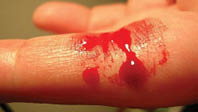
Haemophilia is a rare birth disorder of blood clotting found mostly in male children. If your child suffers easy bruises that bleed for a long time, or experiences unexplained nosebleeds, pain in the joints or passes blood in the urine or stool, chances are that he/she might be suffering from a rare but life-long disorder called Haemophilia. Thankfully, advances in its treatment and the options for managing it having advanced significantly over the past two decades. However, the public awareness about the genetic disorder still remains low. It is important that young parents-to-be are educated about the possibility of having a Haemophilic child, and the resultant challenges. Haemophilia is an acquired-at-birth disorder, more common in children who have a family history of Haemophilia. In Haemophilia, the person has deficiency of the ‘clotting factor’, which is a protein required for normal blood clotting. As a result he/she may suffer prolonged bleeding from even a relatively small wound. Accidents and injuries can develop into life-threatening conditions. More dangerous, however, is the possibility of internal bleeding. Sometimes bleeding can occur in the joints of the knees or elbows, causing pain and discomfort and the risk of an early onset of arthritis. “Till 2-3 decades ago, the prognosis of Haemophilia patients was poor. Many died prematurely, due to internal or external bleeding, and several suffered damage to their joints, leading them to live restricted and far from normal lives. Due to lack of efficient blood screening mechanisms, there was also the risk of problems during blood transfusions. So, life expectancy was low for people with Haemophilia. However, today the treatment and management of Haemophilia is very good and it allows the affected to lead almost normal and longer lives. Early diagnosis and the timely starting of treatment, with some caution, can allow a child to have normal unhindered growth,” said Dr Satish Koul, Internal Medicine, Columbia Asia Hospital, Gurgaon. Blood coagulation mechanism transforms the blood from a liquid into a solid, and in the process prevents bleeding. The coagulation process involves several ‘clotting factors’. Clotting disorder happens when blood is deficient in a ‘clotting factor’. “Today it is possible to determine if you are a Haemophilia carrier even before pregnancy, with the help of medical genetics. And if you are a carrier, it is also possible to determine during pregnancy if the foetus is affected by Haemophilia. However, this entails some risks for the foetus. So patients should talk to their doctors and follow their advice. If you know that your would-be child has Haemophilia, you can be better prepared on how to bring him up. Haemophilia patients can today live fairly normal and productive lives with some care, precautions and treatment mechanisms. The main treatment involved is the injecting of the deficient ‘clotting factor’ into the bloodstream. It may be needed on a regular basis, or just when the bleeding occurs,” added Dr Koul.
This is how Haemophilia is managed:
Infusing ‘clotting factor’: This is done regularly in some cases and occasionally in other cases, depending on the need. This reduces the possibility of internal bleeding and damage to the joints.
Medication: Oral and topical medicines are given/applied in case of an injury, to promote clotting and healing.
Avoiding some medications: Some drugs – like OTC painkillers aspirin and ibuprofen - have a tendency to aggravate bleeding. If you have Haemophilia, ask your doctor to prescribe a safe pain relief drug.
Exercising regularly: This helps strengthen muscles and bones, keeps the joints in good general health, and reduces risk of joint damage due to internal bleeding.
Avoiding contact sports: While running, swimming and aerobics are good exercises for people with Haemophilia, patients are advised to avoid sports that can cause injuries (like cricket, football or hockey). Even mild injuries can result in heavy bleeding. Activities like wrestling and boxing should be strictly prohibited.
Keeping good dental hygiene: Even the healthiest person may not be able to escape a dental surgery at some point. People with Haemophilia need to strictly guard against dental problems, as a tooth extraction can cause a lot of bleeding.
Ensuring safe practices: Follow precautions and safety measures if your child is playing outside, or learning to ride or riding a bicycle. The patient must wear a helmet, elbow and knee pads and protective shoes while playing.
Read More...